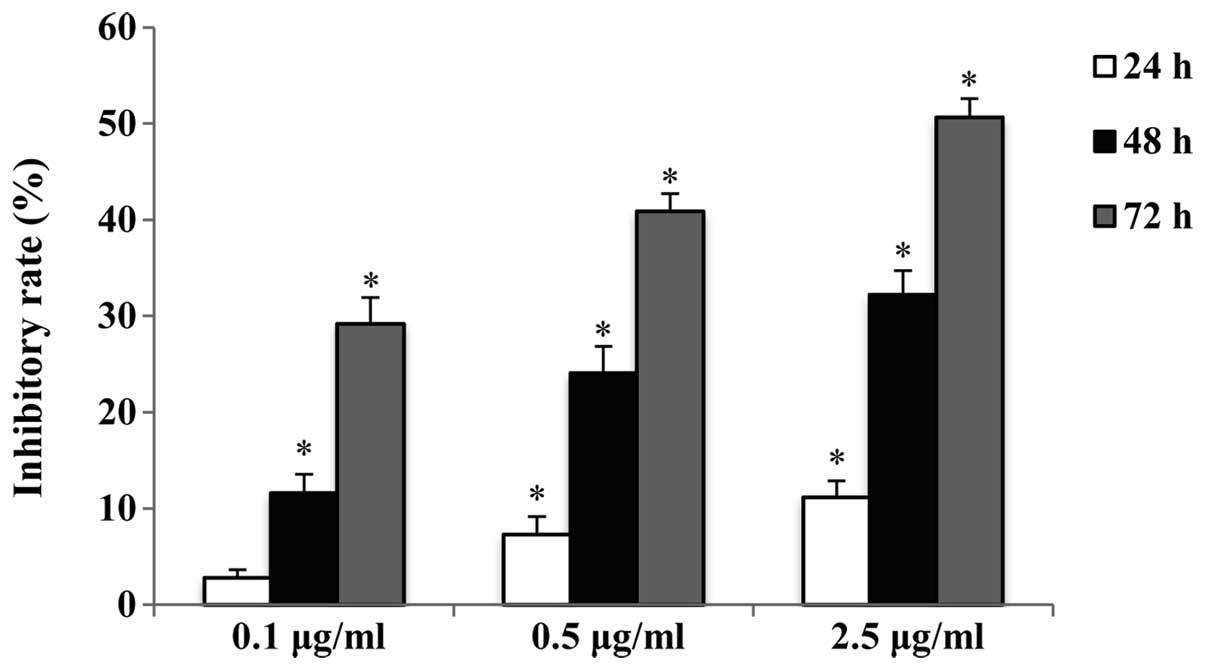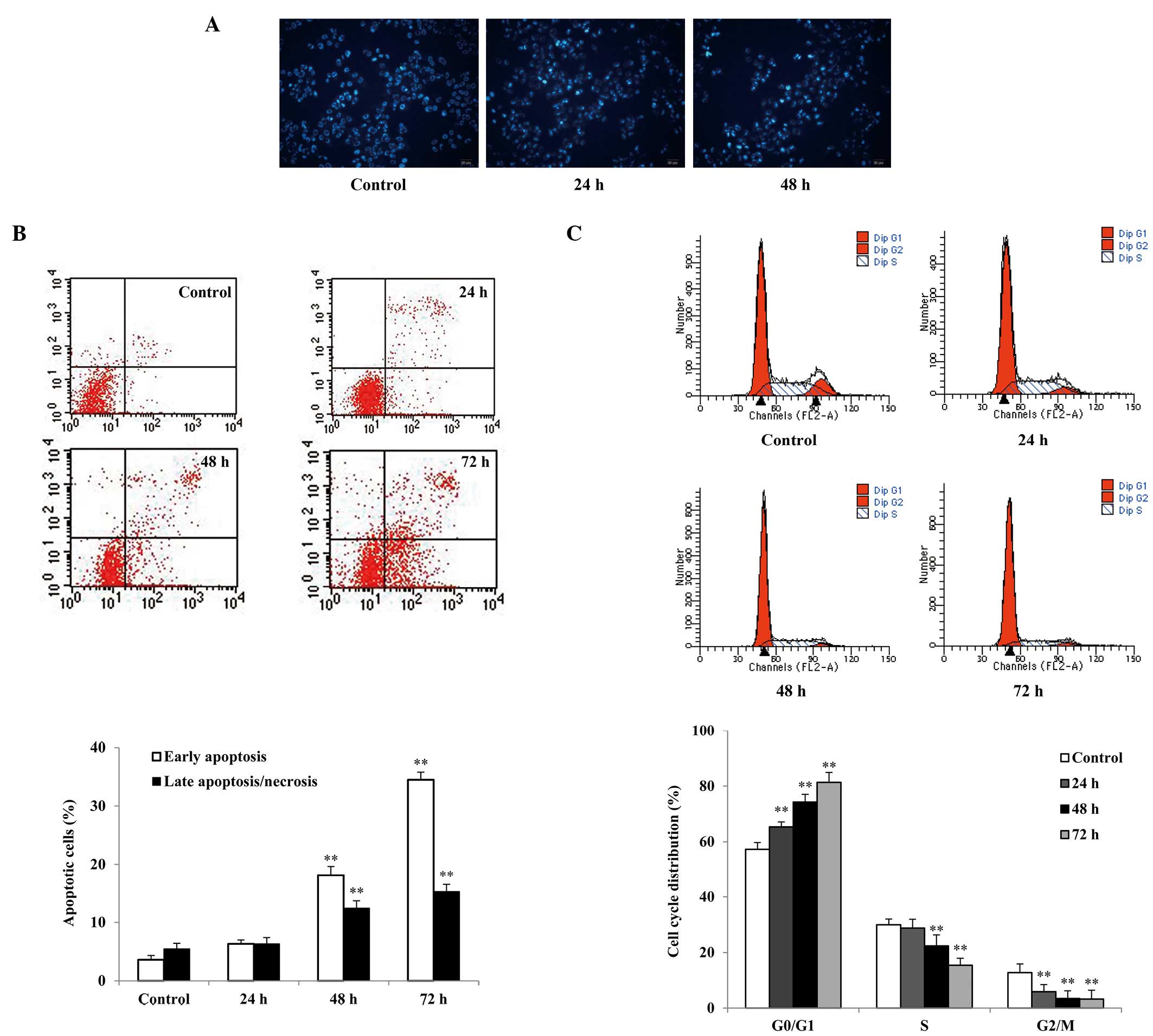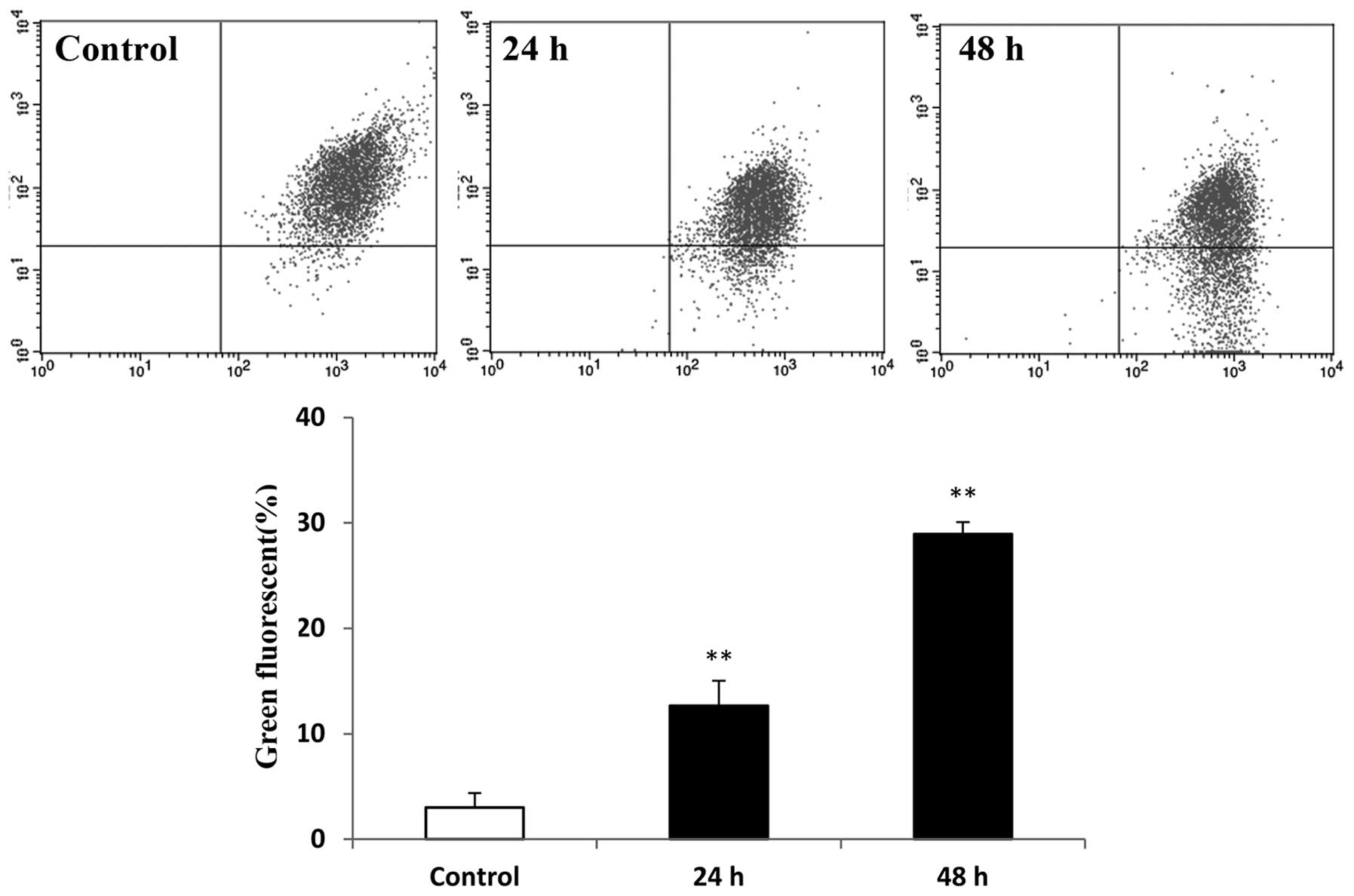|
1
|
Kamangar F, Dores GM and Anderson WF:
Patterns of cancer incidence, mortality, and prevalence across five
continents: defining priorities to reduce cancer disparities in
different geographic regions of the world. J Clin Oncol.
24:2137–2150. 2006. View Article : Google Scholar
|
|
2
|
Jemal A, Bray F, Center MM, Ferlay J, Ward
E and Forman D: Global cancer statistics. CA Cancer J Clin.
61:69–90. 2011. View Article : Google Scholar
|
|
3
|
Saika K and Sobue T: Cancer statistics in
the world. Gan To Kagaku Ryoho. 40:2475–2480. 2013.(In
Japanese).
|
|
4
|
Siegel R, DeSantis C, Virgo K, et al:
Cancer treatment and survivorship statistics, 2012. CA Cancer J
Clin. 62:220–241. 2012. View Article : Google Scholar : PubMed/NCBI
|
|
5
|
Paoletti X, Oba K, Burzykowski T, et al;
GASTRIC (Global Advanced/Adjuvant Stomach Tumor Research
International Collaboration) Group. Benefit of adjuvant
chemotherapy for resectable gastric cancer: a meta-analysis. JAMA.
303:1729–1737. 2010. View Article : Google Scholar : PubMed/NCBI
|
|
6
|
Scartozzi M, Galizia E, Verdecchia L, et
al: Chemotherapy for advanced gastric cancer: across the years for
a standard of care. Expert Opin Pharmacother. 8:797–808.
2007.PubMed/NCBI
|
|
7
|
Reni M, Pasetto L, Aprile G, et al:
Raltitrexed-eloxatin salvage chemotherapy in gemcitabine-resistant
metastatic pancreatic cancer. Br J Cancer. 94:785–791. 2006.
View Article : Google Scholar : PubMed/NCBI
|
|
8
|
Jarmuła A: Antifolate inhibitors of
thymidylate synthase as anticancer drugs. Mini Rev Med Chem.
10:1211–1222. 2010.PubMed/NCBI
|
|
9
|
Hagner N and Joerger M: Cancer
chemotherapy: targeting folic acid synthesis. Cancer Manag Res.
2:293–301. 2010.PubMed/NCBI
|
|
10
|
Ransom D, Wilson K, Fournier M, et al:
Final results of Australasian Gastrointestinal Trials Group ARCTIC
study: an audit of raltitrexed for patients with cardiac toxicity
induced by fluoropyrimidines. Ann Oncol. 25:117–121. 2014.
View Article : Google Scholar
|
|
11
|
Bottomley A, Gaafar R, Manegold C, et al:
EORTC Lung-Cancer Group; National Cancer Institute, Canada:
Short-term treatment-related symptoms and quality of life: results
from an international randomized phase III study of cisplatin with
or without raltitrexed in patients with malignant pleural
mesothelioma: an EORTC Lung-Cancer Group and National Cancer
Institute, Canada, Intergroup Study. J Clin Oncol. 24:1435–1442.
2006.
|
|
12
|
Galetta D, Giotta F, Rosati G, et al:
Carboplatin in combination with raltitrexed in recurrent and
metastatic head and neck squamous cell carcinoma: A multicentre
phase II study of the Gruppo Oncologico Dell’Italia Meridionale
(G.O.I.M.). Anticancer Res. 25:4445–4449. 2005.PubMed/NCBI
|
|
13
|
Lemaire L, Malet-Martino MC, de Forni M,
Martino R and Lasserre B: Cardiotoxicity of commercial
5-fluorouracil vials stems from the alkaline hydrolysis of this
drug. Br J Cancer. 66:119–127. 1992. View Article : Google Scholar : PubMed/NCBI
|
|
14
|
Deboever G, Hiltrop N, Cool M and
Lambrecht G: Alternative treatment options in colorectal cancer
patients with 5-fluorouracil- or capecitabine-induced
cardiotoxicity. Clin Colorectal Cancer. 12:8–14. 2013. View Article : Google Scholar : PubMed/NCBI
|
|
15
|
Lim SC, Parajuli KR, Duong HQ, Choi JE and
Han SI: Cholesterol induces autophagic and apoptotic death in
gastric carcinoma cells. Int J Oncol. 44:805–811. 2014.PubMed/NCBI
|
|
16
|
de Martel C, Forman D and Plummer M:
Gastric cancer: epidemiology and risk factors. Gastroenterol Clin
North Am. 42:219–240. 2013.PubMed/NCBI
|
|
17
|
Bozkurt O, Karaca H, Ciltas A, et al:
Efficacy and safety of raltitrexed combinations with uracil-
tegafur or mitomycin C as salvage treatment in advanced colorectal
cancer patients: a multicenter study of Anatolian Society of
Medical Oncology (ASMO). Asian Pac J Cancer Prev. 15:1845–1849.
2014. View Article : Google Scholar
|
|
18
|
Kelly C, Bhuva N, Harrison M, Buckley A
and Saunders M: Use of raltitrexed as an alternative to
5-fluorouracil and capecitabine in cancer patients with cardiac
history. Eur J Cancer. 49:2303–2310. 2013. View Article : Google Scholar : PubMed/NCBI
|
|
19
|
Kosmas C, Kallistratos MS, Kopterides P,
et al: Cardiotoxicity of fluoropyrimidines in different schedules
of administration: a prospective study. J Cancer Res Clin Oncol.
134:75–82. 2008. View Article : Google Scholar : PubMed/NCBI
|
|
20
|
Saif MW, Shah MM and Shah AR:
Fluoropyrimidine-associated cardiotoxicity: revisited. Expert Opin
Drug Saf. 8:191–202. 2009. View Article : Google Scholar : PubMed/NCBI
|
|
21
|
Ferrari VD, Amoroso V, Valcamonico F, et
al: Epirubicin, cisplatin, and raltitrexed in patients with
advanced gastric and hepatobiliary carcinoma: a phase II study. Am
J Clin Oncol. 27:445–448. 2004. View Article : Google Scholar : PubMed/NCBI
|
|
22
|
Schmid KE, Kornek GV, Schüll B, et al:
Second-line treatment of advanced gastric cancer with oxaliplatin
plus raltitrexed. Onkologie. 26:255–258. 2003. View Article : Google Scholar : PubMed/NCBI
|
|
23
|
Gao YH, Zhang HP, Yang SM, et al:
Inactivation of Akt by arsenic trioxide induces cell death via
mitochondrial-mediated apoptotic signaling in SGC-7901 human
gastric cancer cells. Oncol Rep. 31:1645–1652. 2014.
|
|
24
|
Sinha K, Das J, Pal PB and Sil PC:
Oxidative stress: the mitochondria-dependent and
mitochondria-independent pathways of apoptosis. Arch Toxicol.
87:1157–1180. 2013. View Article : Google Scholar : PubMed/NCBI
|
|
25
|
Renault TT, Teijido O, Antonsson B, Dejean
LM and Manon S: Regulation of Bax mitochondrial localization by
Bcl-2 and Bcl-x(L): keep your friends close but your enemies
closer. Int J Biochem Cell Biol. 45:64–67. 2013. View Article : Google Scholar : PubMed/NCBI
|
|
26
|
Debatin KM: Apoptosis pathways in cancer
and cancer therapy. Cancer Immunol Immunother. 53:153–159. 2004.
View Article : Google Scholar : PubMed/NCBI
|
|
27
|
Circu ML and Aw TY: Reactive oxygen
species, cellular redox systems, and apoptosis. Free Radic Biol
Med. 48:749–762. 2010. View Article : Google Scholar : PubMed/NCBI
|
|
28
|
Martinou JC and Youle RJ: Mitochondria in
apoptosis: Bcl-2 family members and mitochondrial dynamics. Dev
Cell. 21:92–101. 2011. View Article : Google Scholar : PubMed/NCBI
|
|
29
|
Volkmann N, Marassi FM, Newmeyer DD and
Hanein D: The rheostat in the membrane: BCL-2 family proteins and
apoptosis. Cell Death Differ. 21:206–215. 2014. View Article : Google Scholar : PubMed/NCBI
|
|
30
|
Hüttemann M, Pecina P, Rainbolt M, et al:
The multiple functions of cytochrome c and their regulation in life
and death decisions of the mammalian cell: From respiration to
apoptosis. Mitochondrion. 11:369–381. 2011.PubMed/NCBI
|
|
31
|
Hüttemann M, Lee I, Grossman LI, Doan JW
and Sanderson TH: Phosphorylation of mammalian cytochrome c and
cytochrome c oxidase in the regulation of cell destiny:
respiration, apoptosis, and human disease. Adv Exp Med Biol.
748:237–264. 2012.PubMed/NCBI
|
|
32
|
Chen M, Guerrero AD, Huang L, et al:
Caspase-9-induced mitochondrial disruption through cleavage of
anti-apoptotic BCL-2 family members. J Biol Chem. 282:33888–33895.
2007. View Article : Google Scholar : PubMed/NCBI
|
|
33
|
Ola MS, Nawaz M and Ahsan H: Role of Bcl-2
family proteins and caspases in the regulation of apoptosis. Mol
Cell Biochem. 351:41–58. 2011. View Article : Google Scholar : PubMed/NCBI
|
|
34
|
Shen J, Wang H, Wei J, et al: Thymidylate
synthase mRNA levels in plasma and tumor as potential predictive
biomarkers for raltitrexed sensitivity in gastric cancer. Int J
Cancer. 131:E938–E945. 2012. View Article : Google Scholar : PubMed/NCBI
|
|
35
|
Lee KH, Hur HS, Im SA, et al: RAD001 shows
activity against gastric cancer cells and overcomes 5-FU resistance
by downregulating thymidylate synthase. Cancer Lett. 299:22–28.
2010. View Article : Google Scholar
|
|
36
|
Di Cresce C, Figueredo R, Ferguson PJ,
Vincent MD and Koropatnick J: Combining small interfering RNAs
targeting thymidylate synthase and thymidine kinase 1 or 2
sensitizes human tumor cells to 5-fluorodeoxyuridine and
pemetrexed. J Pharmacol Exp Ther. 338:952–963. 2011.
|





















